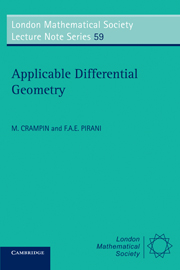Book contents
- Frontmatter
- Contents
- Preface
- 0 The background: vector calculus
- 1 Affine spaces
- 2 Curves, functions and derivatives
- 3 Vector fields and flows
- 4 Volumes and subspaces: exterior algebra
- 5 Calculus of forms
- 6 Frobenius's theorem
- 7 Metrics on affine spaces
- 8 Isometries
- 9 Geometry of surfaces
- 10 Manifolds
- 11 Connections
- 12 Lie groups
- 13 The tangent and cotangent bundles
- 14 Fibre bundles
- 15 Connections revisited
- Bibliography
- Index
1 - Affine spaces
Published online by Cambridge University Press: 05 August 2012
- Frontmatter
- Contents
- Preface
- 0 The background: vector calculus
- 1 Affine spaces
- 2 Curves, functions and derivatives
- 3 Vector fields and flows
- 4 Volumes and subspaces: exterior algebra
- 5 Calculus of forms
- 6 Frobenius's theorem
- 7 Metrics on affine spaces
- 8 Isometries
- 9 Geometry of surfaces
- 10 Manifolds
- 11 Connections
- 12 Lie groups
- 13 The tangent and cotangent bundles
- 14 Fibre bundles
- 15 Connections revisited
- Bibliography
- Index
Summary
When one first begins to learn mechanics one is confronted with a space—the “ordinary” space in which mechanical processes take place—which in many ways resembles a vector space, but which lacks a point playing the distinctive role of zero vector. The resemblance lies in the vector addition properties of displacements and of quantities derived from them such as velocities, accelerations and forces. The difference lies in the fact that the mechanical properties of a system are quite independent of its position and orientation in space, so that its behaviour is unaffected by choice of origin. Of course the Sun, or the mass centre of the Solar System, plays a role in the formulation of the Kepler problem of planetary motion, but the relative motion of the planets does not depend on whether displacements are measured from the Sun or from some other point. Nor does it depend on the choice of origin for time measurements.
The same is true in special relativity theory. Here also the behaviour of a physical system is unaffected by the choice of space-time origin.
In neither case can there be ascribed to any point the distinctive position and properties ascribed to the zero vector in a vector space; nor can any meaning be given to the addition of points as if they were vectors. Nevertheless, one learns to manipulate vectors in ordinary Euclidean space or in Minkowski space-time and to give physical significance to these manipulations, without perhaps paying too much attention to the precise nature of the underlying space or space-time.
- Type
- Chapter
- Information
- Applicable Differential Geometry , pp. 8 - 28Publisher: Cambridge University PressPrint publication year: 1987

